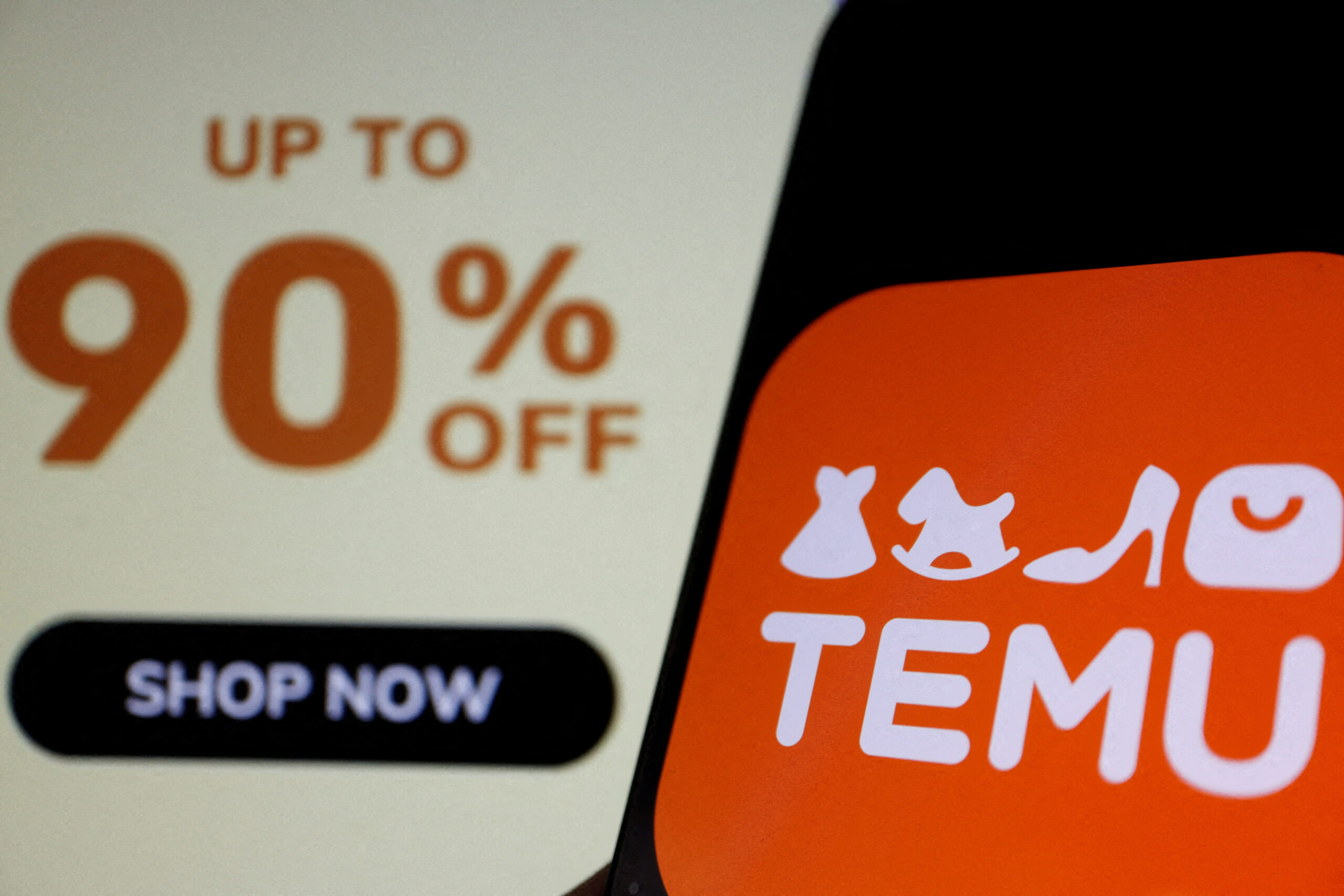
FILE PHOTO: The logo of Temu, an e-commerce platform owned by PDD Holdings, is seen on a mobile phone displayed in front of its website, in this illustration picture taken April 26, 2023. REUTERS/Florence Lo/Illustration/File Photo
Brussels, Belgium — The EU on Thursday hit Chinese-founded shopping platform Temu with a probe over concerns the site is doing too little to stop the sale of illegal products, in an investigation that could lead to large fines.
Extremely popular in the European Union despite having entered the continent’s market only last year, Temu has on average around 92 million monthly active users in the bloc.
Article continues after this advertisementThe investigation will also look at dangers from the platform’s use of gamification and “potentially addictive design” that could hurt users’ “physical and mental well-being,” said the European Commission, the EU’s powerful digital watchdog.
FEATURED STORIES BUSINESS Global Dominion dominates with 1B pesos of loans released in a month BUSINESS Trump vs Harris: Views from PH biz BUSINESS Parisian: The footwear that grew with ShoemartREAD: Consumer groups accuse Temu of manipulating online shoppers
The probe is being launched under a mammoth law known as the Digital Services Act (DSA) that forces the world’s largest tech firms to do more to protect European consumers online.
Article continues after this advertisement“We want to ensure that Temu is complying with the Digital Services Act. Particularly in ensuring that products sold on their platform meet EU standards and do not harm consumers,” EU tech chief Margrethe Vestager said in a statement.
Article continues after this advertisementThe EU wants to know more about the systems Temu has in place to “limit the sale” and how it avoids the “reappearance” of illegal products — once removed — such as pharmaceuticals, chemicals and toys as well as counterfeit goods.
Article continues after this advertisementThe company said it “takes its obligations under the DSA seriously”.
“We will cooperate fully with regulators to support our shared goal of a safe, trusted marketplace for consumers,” a Temu spokesperson said in a statement.
Article continues after this advertisementTemu is in talks about joining a European agreement facilitated by the commission that brings shopping platforms and others together to stop the sale of fake products online.
‘Promising step’The company will also have to explain what measures it is taking to address any risks from its service, including game-like reward programmes.
The probe comes after Temu submitted a risk assessment report to the EU, as well as replies to several demands for information, the latest issued on October 11.
The firm can avoid fines if it makes commitments during the investigation that the EU believes alleviates its concerns.
European consumer groups have previously warned that Temu breaches EU law.
They lodged a complaint in May with the commission, accusing Temu of using “manipulative techniques” to make users spend more and other violations.
Europe’s BEUC umbrella consumer rights group on Thursday welcomed the probe.
“This decision by the commission is a promising step, but only the first. Now, it’s important the commission keeps up the pressure on Temu and pushes the company to comply with the law as soon as possible,” said BEUC’s Fernando Hortal Foronda.
Multiple probesThe EU probe will also look at Temu’s systems and how they recommend content and products to users and analyse the platform’s data access to researchers.
Temu will also have to provide more details about the “parameters” of its recommender systems, which are used by platforms to push more personalised content.
The EU stressed that the “opening of formal proceedings does not prejudge its outcome” and there is no deadline for the probe’s completion.
Temu is among 25 “very large” online platforms that must comply with the DSA or risk fines that could reach as high as six percent of their global turnover, or even a ban for serious and repeated violations.
Other shopping platforms that must comply with the DSA include Chinese online retailer AliExpress, US giant Amazon and Chinese-founded Shein.
Subscribe to our daily newsletter
Other DSA investigations have targeted AliExpressnuebe gaming, social media platform X, which is owned by tech billionaire Elon Musk and used to be called Twitter, as well as Facebook and Instagram owned by Meta.
READ NEXT Concepcion Industrial earnings nearly double Asian stocks mostly fall, tracking global slide EDITORS' PICK PBA Finals: Ginebra dominates TNT in Game 4 to tie series at 2-2 Over P163,000 worth of shabu, gun seized from 2 suspects in Rizal Tropical depression may enter PAR on Nov. 4 Northern Gaza’s hospitals come under attack again PNP-ACG led Manila Pogo hub raid – NCRPO DOJ urged to issue lookout bulletin vs OVP officials MOST READ Marcos, BARMM leaders discuss collaboration for 2025 elections LPA seen outside PAR, chance of becoming a typhoon is low Marcos declares Nov. 4 ‘Day of National Mourning’ PBA Finals: Ginebra dominates TNT in Game 4 to tie series at 2-2 Follow @FMangosingINQ on Twitter --> View comments


